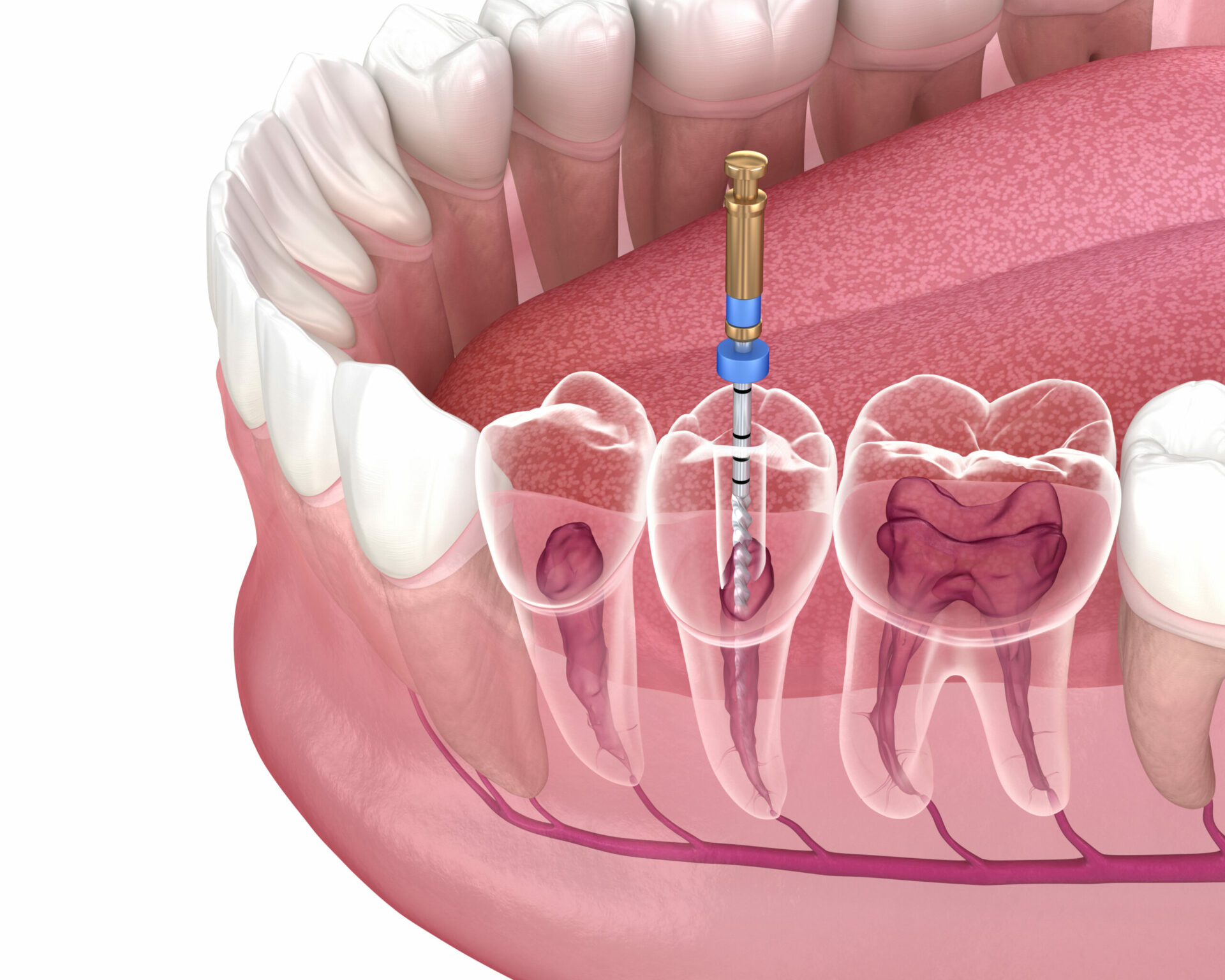Are you experiencing severe tooth pain or sensitivity? It might be time to consider getting a root canal. Root canal treatment is a common dental procedure that can save your natural tooth and alleviate your pain. If you’re in Oakville and in need of a root canal, finding the best dentist in Oakville is crucial for a successful treatment. In this blog post, we will cover everything you need to know about root canal treatment, from understanding the procedure to aftercare and recovery.
Understanding Root Canal Treatment
Let’s dive into what a root canal treatment involves, making it less of a mystery and more of a clear, straightforward process. At its core, root canal treatment, also known as endodontic therapy, is a dental procedure designed to tackle problems inside the tooth. Think of it as a mission to save your tooth from the troubles caused by damaged or infected pulp.
The pulp is the inner sanctuary of your tooth, where nerves, blood vessels, and connective tissue live. It’s vital for your tooth’s growth and development. However, when bacteria find their way in, due to decay or injury, this once peaceful area can become a battleground of infection, leading to pain and sensitivity.
The goal of a root canal is to come to the rescue by removing the troubled pulp, cleaning out the bacteria, and sealing the space to protect it from future invaders. This not only relieves the pain but also keeps your tooth intact and functional.
So, when you’re facing tooth pain and hear “root canal” as a recommendation, know it’s not the villain in your story. Instead, it’s the hero, ready to save your tooth and bring back your smile. In Oakville, finding the right dentist for this task is key to a smooth, successful treatment experience.
Signs You Might Need a Root Canal
Wondering if you might need a root canal? There are a few telltale signs that shouldn’t be ignored. First off, if you’re dealing with severe tooth pain, especially when you bite down or apply pressure, it could be a signal that a root canal is needed. Also, watch out for sensitivity to hot or cold that lingers long after the hot or cold item is no longer in contact with your tooth. This kind of prolonged sensitivity is not normal.
Next up, keep an eye on your gums. Swelling, tenderness, or a noticeable bump on your gums near the area of tooth pain can be a sign of infection that might require a root canal. Additionally, if you notice your gums darkening or a tooth becoming discolored without any clear reason, it’s worth checking out. These could be signs that the pulp inside your tooth is damaged and infected, leading to the need for a root canal.
Lastly, if you experience any of these symptoms, it’s crucial to seek out a professional opinion. Don’t wait for the pain or sensitivity to become unbearable. A timely visit to a dentist in Oakville can help diagnose the issue and determine if a root canal is the right course of action for you. Remember, catching these signs early can save you from more severe pain and complicated procedures down the line.
Finding the Best Dentist in Oakville for Your Root Canal
Choosing the right dentist for your root canal in Oakville is a step you can’t afford to overlook. It’s not just about getting the procedure done; it’s about ensuring it’s done right, with minimal discomfort and the best outcomes for your dental health. Start by seeking recommendations from people you trust—friends, family, or even coworkers who have had similar dental work done in Oakville. Their firsthand experiences can provide invaluable insights.
Next, tap into the power of the internet. Online reviews and testimonials on dental clinics in Oakville can offer a glimpse into other patients’ experiences. Look for a dentist who is not only experienced in performing root canals but also known for their patient care and communication. A good dentist will make you feel comfortable, answer all your questions, and explain the procedure in a way that’s easy to understand.
Don’t hesitate to schedule consultations with potential dentists. This is your opportunity to meet them, assess their office and equipment, and get a feel for their approach to dental care. Remember, the goal is to find a dentist who you feel confident and comfortable with, ensuring your root canal treatment is as smooth and successful as possible.
What to Expect During Your Root Canal Procedure
When you go in for a root canal, here’s a simple rundown of what happens. First, your dentist will make sure you’re comfy by numbing the area around your tooth, so you won’t feel a thing during the procedure. Think of it as putting that part of your mouth to sleep. Next, they’ll get to work on the main event: removing the infected or damaged pulp from inside your tooth. With the precision of a skilled artist, your dentist will clean out all the bad stuff, rinse the inside of your tooth to make sure it’s squeaky clean, and then fill it up to keep it strong and protected. Finally, they might top your tooth with a filling or a crown, kind of like putting a protective hat on it, to make sure it’s safe from future harm. This whole process usually wraps up in just one or two visits. And there you have it, a step-by-step of what happens during a root canal, designed to bring your tooth back to its glory days!
Aftercare and Recovery Post-Root Canal
Taking care of your tooth after a root canal is key to a smooth recovery. Your dentist will give you a list of dos and don’ts to follow. For starters, you might want to stick to soft foods for a few days. This gives your tooth a break and helps prevent any discomfort. If your dentist prescribes medication, make sure to take it as directed. This can help with any pain and keep swelling down.
It’s normal to feel some tenderness in the area for a few days. But, if you notice anything unusual or if the pain seems to get worse, don’t hesitate to call your dentist. They’re there to help you heal without hitches.
Remember to keep brushing and flossing your other teeth like usual, but be gentle around the treated tooth. This keeps your mouth clean and aids in healing. Follow-up visits to the dentist are also part of the game plan. These check-ins let your dentist make sure everything is healing right and that your tooth is getting back to its happy, healthy self.
By taking these steps, you’ll be on your way to a quick recovery, ready to enjoy all your favorite foods and activities again without tooth pain getting in the way.
How to Prevent Future Root Canals
Keeping your teeth healthy and steering clear of future root canal treatments isn’t as tough as it might seem. The key is caring for your teeth every day. Make sure to brush twice daily with a fluoride toothpaste and don’t skip on flossing at least once a day. This routine helps kick away harmful bacteria and prevents decay, which is often the culprit behind needing a root canal.
Next up, remember to visit your dentist regularly. Those check-ups and cleanings play a big role in catching any problems early on, before they turn into bigger issues. It’s like having a good friend who’s always looking out for you.
Eating and drinking also have a big impact on your teeth. Try to keep sugary snacks and drinks to a minimum. Sugar is like a feast for bacteria, leading to cavities and then to more serious problems that might require a root canal. Instead, fill up on foods that are good for your teeth, like fruits, vegetables, and dairy products that provide calcium.
And here’s a smart tip: if you’re into sports or activities where you might get a bump to the face, wearing a mouthguard can be a real tooth-saver. It’s an easy way to protect your teeth from injuries that could lead to damage needing a root canal.
By sticking to these simple habits, you can keep your smile bright, healthy, and far away from the root canal treatment room.
Debunking Common Myths About Root Canals
Many people think root canals are super painful and might even make you sick. But that’s not true! Modern root canal treatmentsin Oakville are much smoother and almost pain-free, thanks to advances in dental technology and anesthesia. Plus, they don’t cause illness. Instead, root canals help stop infections in your tooth from spreading and making things worse. So, if your dentist says you need a root canal, there’s no need to worry. It’s a safe way to save your tooth and get rid of pain, not cause more problems.



